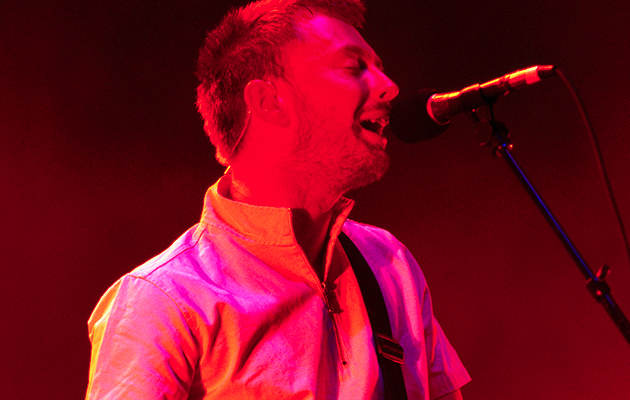https://www.youtube.com/watch?v=sPLEbAVjiLA
A sleeper hit propelled by positive word-of-mouth, The Bends would gradually notch up two million global sales and re-enter the Billboard Hot 100. It eventually went platinum in Britain and climbed to a late peak of Number Four. But as 1996 dawned, Radiohead’s second album seemed overlooked and underrated.
In February, Yorke and Brian Eno jointly collected the Freddie Mercury prize at the Brits for the WarChild compilation, Help. But Radiohead were beaten in all their nominated categories by all-conquering new boys, Oasis. The Gallaghers had become rock’s new clown princes almost overnight, much to Yorke’s disdain. He dismissed the Mancunian brothers as “a freak show” and “mentally ill”.
In this charged atmosphere, work began on the next Radiohead album. Writing and recording self-produced material with an open-ended deadline was supposed to defuse tensions between the group. Instead it made them worse. But initial sessions at Canned Applause were marred by problems more fundamental than musical differences. According to Jonny, “There was nowhere to eat or defecate, which are two fairly basic human drives.”
In August, Radiohead played a short US tour supporting Alanis Morissette. The “silly money” they earned almost made up for Morissette’s big-haired covers of “Creep” and “Fake Plastic Trees”. Back in Britain, with £100,000 worth of newly purchased mobile studio equipment, Radiohead decamped with engineer Nigel Godrich for two months to St Catherine’s Court, actress Jane Seymour’s 15th-Century mansion near Bath.
The location was beautiful, spooky and silent. Inevitably, Yorke hated it. “It became a complete fever, like being ill all the time,” he said afterwards. “It was fucking horrible, I could never sleep.”
OK Computer was initially planned as an upbeat reaction to The Bends and defiant demolition of Radiohead’s gloomy image. But as recording progressed, its trip-hop symphonies and sci-fi lullabies brimmed over with nausea, disgust and travel sickness: “The crackle of pig skin, the yuppies networking/The vomit, the vomit.” Pigs, crashing vehicles and millennial despair became recurring motifs. “To me, the album’s more about speed and transport rather than the future and technology,” says Jonny Greenwood now. “The songs are very transparent; it’s very clear what they’re about.”
Yorke tried to make his voice sound different on every track. “He was getting very sick of the fact that he could sing about garden furniture and it would still sound very passionate,” says the guitarist. Dark references to “the IMF and cattle prods” also reflected the singer’s growing interest in “voodoo economics” and digestion of political tracts like Will Hutton’s The State We’re In and Eric Hobsbawm’s The Age Of Extremes.
The track “Fitter, Happier” was voiced by computer speech software and ended with the brutal comment on modern consumerism, “a pig in a cage on antibiotics” – a line adapted from Jonathan Coe’s darkly comic novel about arms dealing and the death of the welfare state, What A Carve Up! This extraordinary slice of digital nihilism was even considered as the lead-off single for OK Computer.
Instead, the towering six-and-a-half minute “Paranoid Android” was chosen with an animated video by Magnus Carlsson featuring murder, mutilation and topless mermaids. MTV censored the mermaids. Eleven minutes long in its original form, this neo-prog epic was hailed as a “Bohemian Rhapsody” for the ’90s. Jonny began to despise it. “I just couldn’t stand it after the second time,” he recalls. “If I was working in a shop or a factory, I’d go out for a cigarette break.”
Colin Greenwood says “the idea behind “Paranoid Android” was to do a combination of DJ Shadow and The Beatles. We’ve always aimed ourselves at this trajectory towards other people’s music that we’ve fallen in love with. It’s like a lover’s flattery: we try to emulate these people and we always fall short. When we did “Creep” we were heavily into Scott Walker. We aim for the stars, and we hit just north of Oxford – ha!”
Ominously, Radiohead’s US record company Capitol heard OK Computer and immediately downgraded sales forecasts from two million to 500,000. Radiohead themselves were hardly expecting to find themselves the most acclaimed band on Earth in the summer of 1997.



